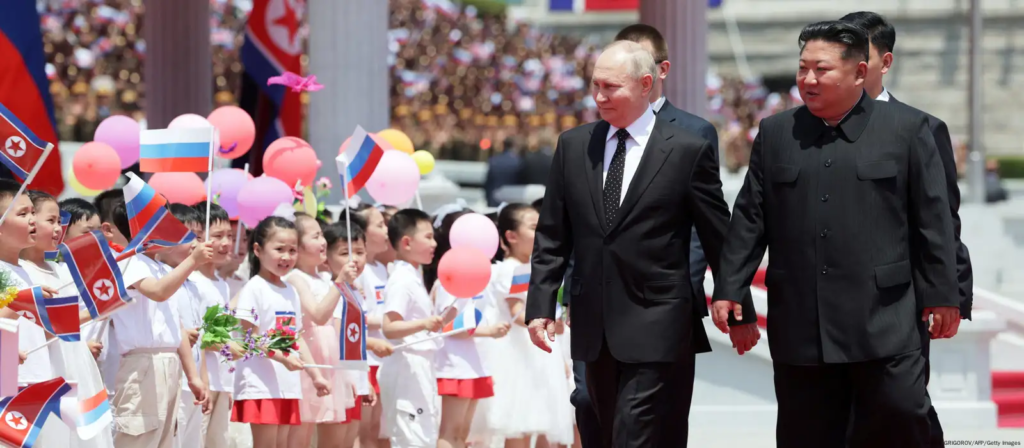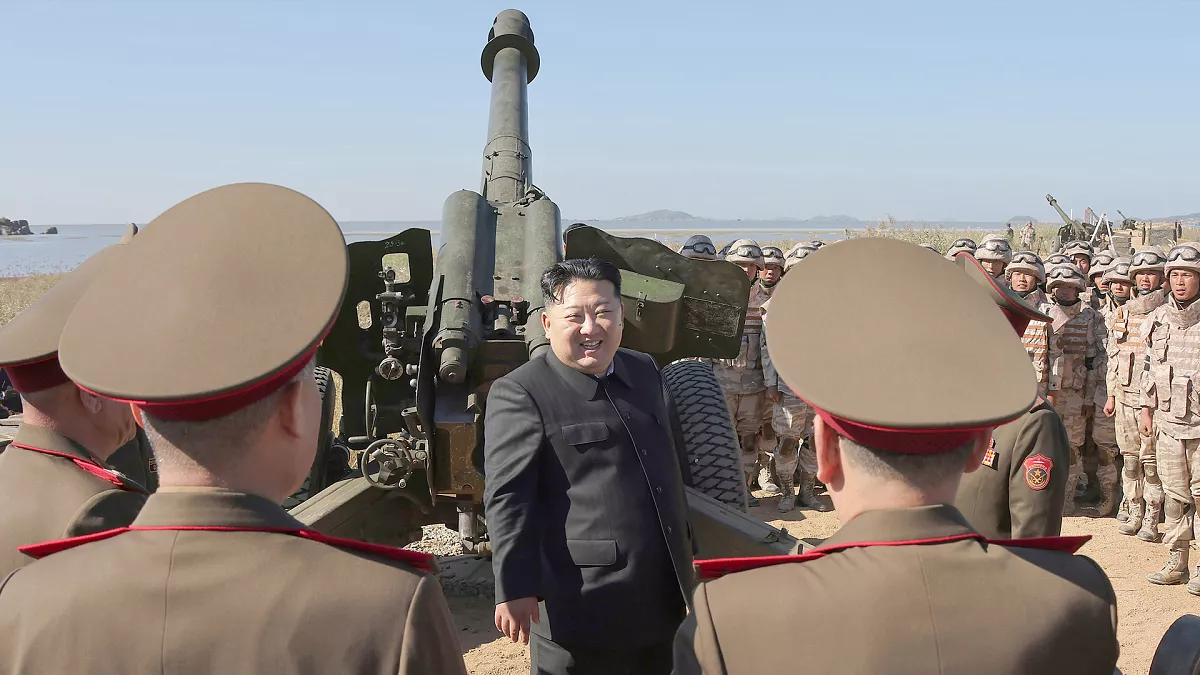North Korea supporting Russia in its war against Ukraine is no longer just a speculation, as Ukraine’s President Volodymyr Zelensky confirmed Pyongyang’s increasing involvement. According to Zelensky, North Korea has moved beyond merely supplying arms and has now sent troops to bolster Russia’s military forces.
The involvement of North Korean soldiers in the ongoing conflict points to a deepening alliance between two authoritarian regimes, raising concerns about a broader geopolitical shift in support of Russia’s aggressive actions.
The conflict, which has dragged on for three years, shows no signs of de-escalation. As Ukraine continues to battle Russian forces, the addition of North Korean manpower and military aid adds a new dimension to the global dynamics at play.
For Ukraine and its allies in the West, this revelation underscores the urgency of increasing military support to counteract Russia’s growing alliances.
North Korea’s Role in the Russia-Ukraine War
Ukraine’s President Volodymyr Zelensky, in his recent address, expressed concern about North Korea’s growing involvement in Russia’s military operations. While reports of North Korean weapons being supplied to Russia have circulated for some time, Zelensky’s statement now confirms that North Korea is contributing not just arms, but also personnel.
Read : Kim Jong Un Said North Korea Will Exponentially Increase Nuclear Arsenal for Combat with the US
The involvement of North Korean troops is alarming for several reasons. First, it indicates the willingness of Pyongyang to openly support Russia’s war effort, despite international condemnation of Russia’s invasion of Ukraine.
Read : Ten interesting facts about Kim Jong Un – the Supreme Leader of North Korea
Second, it introduces a new variable into the conflict: North Korean soldiers are known for their loyalty to their regime and their experience in tough, highly disciplined military operations. This could potentially give Russian forces a boost on the battlefield, particularly in areas where they have faced significant Ukrainian resistance.
Zelensky’s address emphasized that this partnership between Russia and North Korea is not just about arms transfers but includes actual military cooperation, with North Korean troops playing an active role on the frontlines.
This, Zelensky warned, signals the need for Ukraine and its Western partners to escalate their own military efforts. The goal, he said, is not just to match the capabilities of the Russian-North Korean alliance but to overwhelm them in a way that could potentially turn the tide of the war.

The implications of this alliance extend beyond the battlefield. North Korea’s actions also reflect broader geopolitical trends, in which authoritarian regimes are increasingly aligning themselves against democratic nations and institutions.
This growing divide underscores the importance of international cooperation and military preparedness to counter the collective threats posed by regimes like those in Russia and North Korea.
Geopolitical Implications of North Korea supporting Russia
The Russia-North Korea alliance has profound implications for global security and geopolitics. Historically, North Korea has maintained a reclusive stance in international affairs, focused largely on its nuclear ambitions and domestic policies of isolation.
However, North Korea’s decision to support Russia militarily in Ukraine signals a shift in its international strategy. It suggests that Pyongyang is willing to actively engage in conflicts that align with its interests, particularly in opposing Western democracies.
One reason for this alliance could be North Korea’s desire to secure economic and military benefits from Russia. With both countries facing international sanctions and diplomatic isolation, they may view mutual support as a way to withstand economic pressure from the West.
For North Korea, aligning with Russia could also enhance its security, providing it with more powerful military technology and possibly nuclear capabilities in the future.
For Russia, North Korea offers a unique set of advantages. North Korea’s weapons, particularly artillery systems and rocket launchers, can bolster Russia’s war capabilities at a time when it is running low on resources.
Furthermore, North Korean soldiers bring a level of discipline and tactical experience that could be valuable in urban and guerrilla warfare scenarios, which have become common in Ukraine. This alliance is also troubling for the international community, as it demonstrates the willingness of authoritarian regimes to cooperate militarily against democratic nations.
As Zelensky pointed out, the Russia-North Korea partnership raises the stakes of the conflict in Ukraine, as it threatens to expand into a broader confrontation between authoritarian and democratic states. The longer Russia is able to maintain and strengthen these alliances, the more difficult it will be for Ukraine and its Western allies to achieve a decisive victory.

The involvement of North Korea in the Ukraine conflict also complicates diplomatic efforts to resolve the war. With North Korea now playing an active role, any potential peace negotiations may need to consider Pyongyang’s interests as well. This could further delay any resolution to the war and increase the risk of the conflict spreading to other regions.
Zelensky’s Call for Increased Military Aid
In response to the growing threat posed by the Russia-North Korea alliance, Zelensky has renewed his call for increased military aid from Ukraine’s allies. His recent tour of European capitals, including Berlin, London, Paris, and Rome, was aimed at securing more financial and military support to bolster Ukraine’s defenses.
Zelensky has been clear in his message: Ukraine cannot win this war alone. The ongoing conflict has drained Ukraine’s resources, and the addition of North Korean troops to Russia’s forces presents a new challenge that requires more advanced and sustained military aid.
Zelensky specifically highlighted the need for long-range weapons, which would allow Ukraine to strike deeper into Russian-held territory and weaken their supply lines.
The president’s appeal for more aid comes at a critical time, as Ukraine prepares for winter—a season that could further complicate military operations. Zelensky has warned that without sufficient support, the conflict could drag on indefinitely, leading to more destruction and suffering.
He also stressed that a failure to act now could have global consequences, as the alliance between Russia and North Korea could embolden other authoritarian regimes to take similar actions in future conflicts.
Zelensky’s message has resonated with many Western leaders, who have expressed their continued support for Ukraine. However, there are growing concerns about the sustainability of this support, particularly as the war drags into its third year.
Some European countries are facing domestic pressure to reduce their military aid to Ukraine, while others are dealing with economic challenges that make it difficult to provide the level of assistance Ukraine needs.

Despite these challenges, Zelensky remains determined to secure more aid and keep the pressure on Russia. In his view, the key to victory lies in maintaining a strong international coalition and ensuring that Ukraine has the resources to continue its fight.
He believes that with enough support, Ukraine can not only repel Russian forces but also weaken the alliances that Russia has built with countries like North Korea.
The stakes are high, and Zelensky’s call for action is a reminder of the broader consequences of the war in Ukraine. It is not just a conflict between two nations, but a battle between opposing ideologies and systems of governance.
The involvement of North Korea in this war only heightens the urgency of the situation, as it demonstrates the willingness of authoritarian regimes to support each other in their efforts to undermine democratic nations.
North Korea’s involvement in Russia’s war against Ukraine marks a significant escalation in the conflict and underscores the growing alliance between authoritarian regimes. The transfer of both weapons and troops from North Korea to Russia represents a new phase in the war, one that poses significant challenges for Ukraine and its allies.
As President Zelensky has made clear, this alliance requires a robust and coordinated response from the international community. The implications of this partnership extend far beyond the battlefield, as it signals a broader geopolitical realignment that could have lasting consequences for global security.
As the war grinds on into its third year, the stakes have never been higher. Zelensky’s call for increased military aid is not just about winning the war—it is about preventing a larger, more destructive conflict that could threaten the stability of the entire world.

